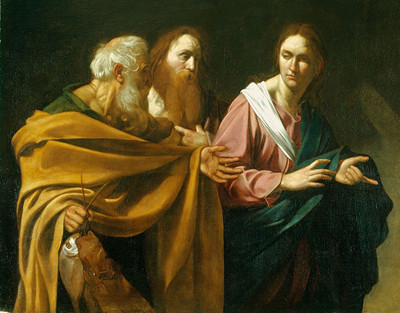The Gospel of John reminds us today that we are called to be disciples. We are all called to minister and proclaim God's word to the nonbeliever (to evangelize) and to share that word with our fellow believers (to catechize). How we respond to His call is the measure by which we reflect his constant presence to the world and how the Good News of Salvation is spread throughout it.
 But for many folks these days, there is no such thing as "good news." God seems distant, disconnected, unconcerned, unforgiving. Our vision can be so clouded by false and misleading concepts of God and Church, that we cannot see the Good News as it is placed before us. Our purpose can become so blurred that the news we bring is not "good" at all. It's not good news if suffering, death and other human tragedies are seen as "God's will." It is not good news if God's love is felt as conditional, unattainable or limited only to certain groups of people. It is not good news to preach the value and dignity of human life, and then blindly turn our eye to the refugee, the poor and homeless. It is not good news to preach peace and justice, and stand by idly as nations continue to war.
But for many folks these days, there is no such thing as "good news." God seems distant, disconnected, unconcerned, unforgiving. Our vision can be so clouded by false and misleading concepts of God and Church, that we cannot see the Good News as it is placed before us. Our purpose can become so blurred that the news we bring is not "good" at all. It's not good news if suffering, death and other human tragedies are seen as "God's will." It is not good news if God's love is felt as conditional, unattainable or limited only to certain groups of people. It is not good news to preach the value and dignity of human life, and then blindly turn our eye to the refugee, the poor and homeless. It is not good news to preach peace and justice, and stand by idly as nations continue to war.
We live in a contradictory world heavy with human dysfunctionality. We hear the pleas of wounded humans crying out for justice and for a divine power to intervene. We see them in despair as they receive no answer.
Yet we believe that there is Good News and that many people are at work for justice and peace. The call to discipleship is not one of revolution but of the retrieval of one of the most important elements in the church's tradition - service. And it has little, if anything, to do with "going to church" every Sunday or feeling good about ourselves as we sing our hymns and carols.
Service is what "discipleship" is all about. Throughout our life's journey the idea of "service to others" may take on many forms or varied flavors. And there may be a lot of mixed motives in our faithfulness to this ideal. It may be habit, or training, or family tradition. Perhaps, like Eli in our first reading, priests and nuns have been strong influences on our choice. Perhaps the example of parents, relatives and friends have been a factor. But when our faith is challenged, when the call to discipleship is really difficult to live up to, we need to have a source to which we can return - time and again - to be refreshed, renewed and revitalized. As mature, free and responsible adults, we have to have a solid, tested, reasonable base for our faith, for our decisions, for our actions, and for the fundamental values we live by.
It may be that we need to focus a little more on the Kingdom of God outside of our static notions of Church. This may rankle some, but this is exactly what Christians are called to do. We've been gifted with the opportunity to live outside the walls of what's socially acceptable and to be involved in ministering to all the people of God in the diaspora. To make Him present and credible here and now, at every moment of our lives, is what the Kingdom of God is all about.
The Lord called Samuel by name. He called Simon by name and gave him a new name. He called the first disciples by name. For us - as those called by name in baptism - making the Kingdom of God present in the world is what defines our call to discipleship.
Christ is the Father's gift. He is the revelation of God's truth and love. He is the Lamb of God who takes away our sin. And he calls us to "Come and see for ourselves."
We are living in a chaotic moment of history where the old is crumbling and the new is being rebuilt from the shattered. But The Spirit of Jesus is very much alive and the chaos itself is the catalyst for change. Let us find hope amidst life's chaos. Jesus has died. Jesus has risen. Jesus will come again and again and again.
Image: "The Calling of Saints Peter and Andrew" - Caravaggio





